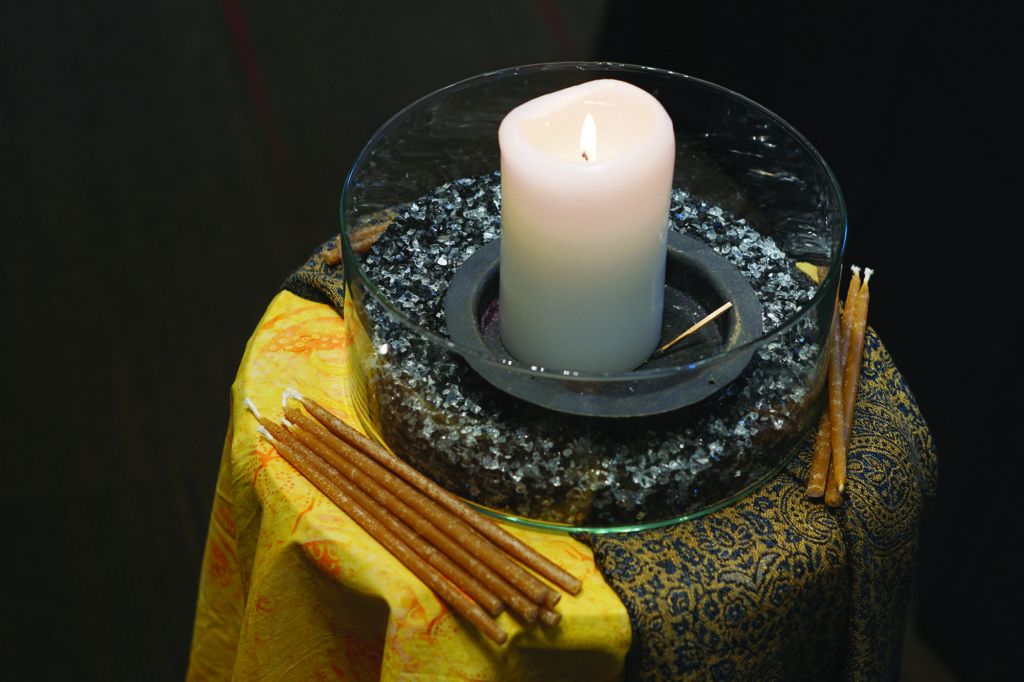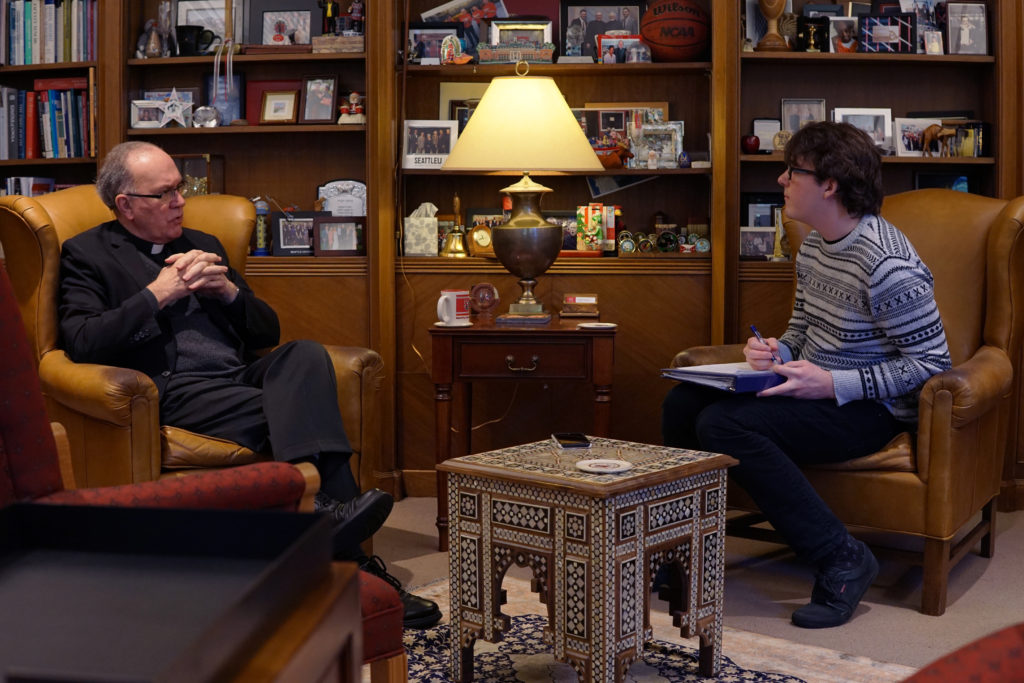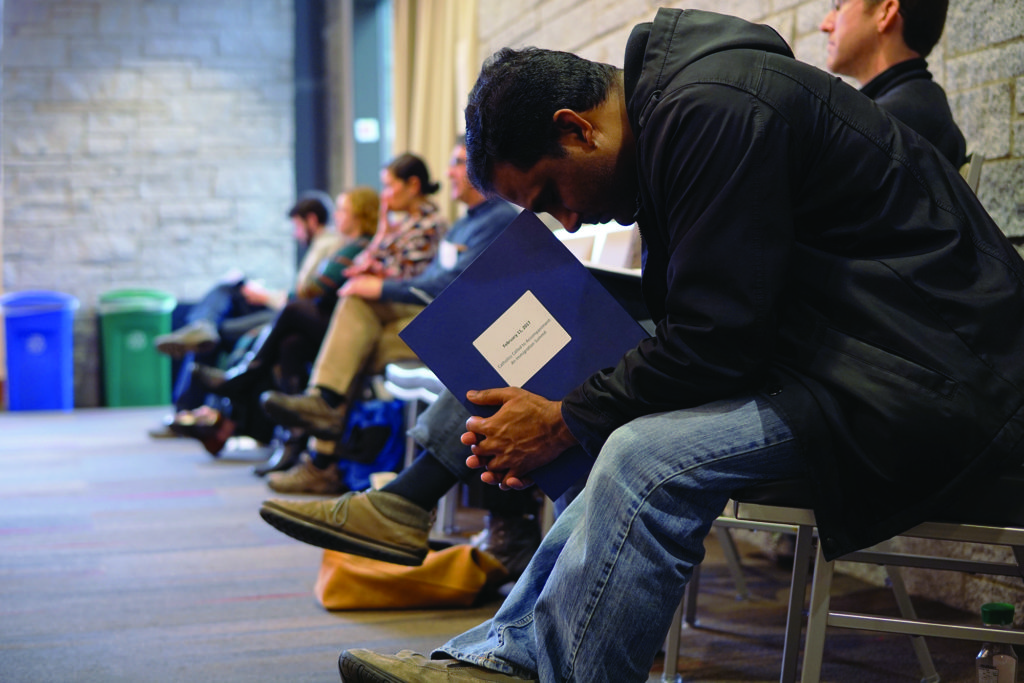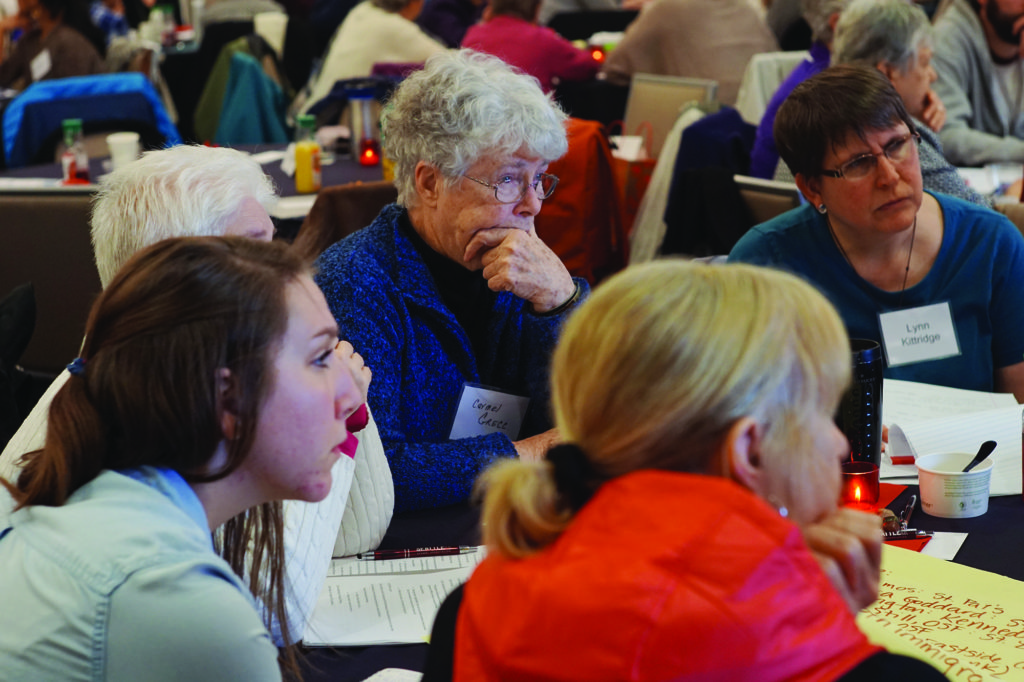Since President Donald Trump took office, students’ phones have been flooded with ‘breaking news’ notifications. For some, the news of Trump’s first executive orders has led to apprehension regarding the future of immigrants, refugees and undocumented citizens in the United States.

As the Immigration Summit began, the flame of a large candle was used to light smaller candles at each table to signify unity and communion.
“I’m very anxious all the time,” said senior public affairs major Carlos Rodriguez. “It’s difficult for me to concentrate when I’m busy thinking about everything that’s going on.”
Rodriguez finds that his status as an undocumented immigrant affects almost everything in his life.
“Being undocumented, until recently, I didn’t realize that it literally affects every aspect of my life,” he said. “From being able to get an ID or driver’s license, getting a job, applying to college, getting financial aid for college, housing.”
Further, since making his status public, Rodriguez finds himself even more paranoid.
“People just look at me all the time,” he said. “I don’t know what they’re thinking and I, at the same time, don’t want to know. But I’ll be at the Bistro, and people will turn their heads and look at me. So I think there’s a lot of paranoia around whether or not they support me. Even just going back to my apartment, I make sure that no one’s following me.”
In terms of the resources available on campus, Rodriguez has mixed feelings.
“There are 228 Catholic Universities in the United States, and I don’t think there’s a single one of them that wasn’t founded primarily to serve immigrants.”
– President Fr. Stephen Sundborg, S.J.
The fact that Seattle U accepts undocumented students he said, contributes to a sense of security on campus. From a more general point of view, he said that the city of Seattle and its liberal mindset make him feel safer than he would have felt in his home state of Georgia.
On the other hand, Rodriguez says that the university fails in some ways as well.
“I think there should have been [and] could have been…more done to support undocumented students throughout the college process,” he said. “Yeah, there’s resources, but I usually have to do some digging for me to get an answer about my status here, or anything related to this university and my status. So if those processes were easier, that would make me feel not just safe, but more comfortable and willing to be a part of this university.”
In an attempt to show solidarity with students threatened by the new administration, many universities across the nation have begun to identify themselves as “sanctuary campuses.”
This term, in itself, means very little. It has no formal definition, and signifies merely a commitment to protect undocumented students in whatever ways they can.
Seattle U has not chosen to declare itself one of these campuses as a result of the term’s ambiguity.
“Seattle University hasn’t identified with that, and part of the reason is that that term isn’t defined,” said Assistant University Counsel Dave Lance. “Rather than focusing on whatever we want to call it, we can talk about what Seattle University really does for our undocumented students, which is, I think, the heart of it.”
The administration’s supportive attitude toward undocumented students is no secret, and it never has been.
University President Fr. Stephen Sundborg, S.J. said that this attitude is deeply rooted in Catholic social teaching.

President Sundborg (left) sat down with Josh Merchant, Spectator staff writer, to talk about undocumented students at Seattle University.
“I was thinking—there are 228 Catholic Universities in the United States, and I don’t think there’s a single one of them that wasn’t founded primarily to serve immigrants,” he said. “So whether it was Seattle University in 1891 with Irish and German Catholics coming to the Seattle area, whether it was any other of the 228, really our higher education system in the United States was founded with a particular interest in being able to educate immigrant Catholic populations that came here in vast numbers and otherwise didn’t have the opportunities in America for education.”
In 2010, Fr. Sundborg wrote an Op- Ed for the Los Angeles Times in favor of the DREAM Act, which had just been reintroduced to Congress.
Although that specific bill failed to pass at the time, the university has voiced its support for the recent BRIDGE Act, which attempts to further protect undocumented students.
“The university has reached out to our senators in support of that,” Lance said. “And there’s a few other letters of support that have come from various colleges and university presidents that we’ve signed onto.”
As far as concrete action goes, “we do whatever under the law we’re able to do,” Lance said.
“During the admission process, if a student’s undocumented, that has no bearing on whether or not they would get admitted. If the federal government weretocomeanddosomesortofan immigration enforcement action, the university is not gonna work with them, unless they’re required to do so,” he said.
Fr. Sundborg said that while he’s working to protect undocumented students on campus, he’s had difficulty with communicating effectively with them.
“It’s one thing to put out a communication and indicate these are the resources that we can provide,” he said. “[But] you wonder after a period of time, how much does a statement help? It’s some assurance, and they know where the university stands and it’ll do everything it can within the limits of the law to be supportive of our students, but you need direct communication.”
Natasha Martin, Associate Vice Provost for Institutional Inclusion and Chief Diversity Officer, said that she hopes that this university feels safe for undocumented students.
“I would say, even though the ‘sanctuary campus’ moniker doesn’t have a legal effect when we’re talking about a university setting, that the desire and the intention of this university is that they do feel like this is a sanctuary for them,” Martin said. “I’m certainly available. I want to hear from them to the extent they’re comfortable.”

A man closed his eyes and lowered his head during a presentation on refugees at the Immigration Summit on Saturday.
As for what the Seattle U community can do to protect undocumented immigrants both on campus and in the greater community, there are many routes to take.
“Everyone keeps asking, ‘how can I best support you?’” said Rodriguez said. “I would say validating—not even that. Listening to people’s stories. You don’t have to validate someone’s story to make them feel better. I do not need validation from anyone. My life is real, and I have real lived experiences, and that’s something that only I know and will understand, so I don’t need anyone to validate that for me…How I came from being a Mexican citizen and crossing the border and then being here in college, all of that is a real experience. And having people know that, I think, in a way, [makes them] see how personally this administration can affect people like me.”
“The other thing is calling Congresspeople,” he said. “I think there’s a lot of power there.”
“First and foremost, just to be there to support each other,” suggested Martin. “Whether or not that means engaging in courageous acts of love, and whether that means you are looking them in the eye when they feel invisible and otherwise diminished, whether it means sitting with them and listening to their feelings about their experiences and doing that with an open mind and without judgment.”
At an event hosted by the Institute for Catholic Thought and Culture on Saturday, community leaders attempted to address the recent immigration rhetoric through a lens of Catholic social teaching.
In her speech on this topic, Executive Director at Intercommunity Peace and Justice Center Patty Bowman quoted both scripture and Catholic officials as evidence that Catholic social teaching calls upon its followers to welcome refugees and immigrants.
“To quote the bishop,” Bowman said, “‘The church recognizes the right of the sovereign to protect and control its borders in the service of the common good of its citizens. However, this is not an absolute right. Nations also have an obligation to the universal common good, and thus should seek to accommodate migration to the greatest extent possible.’”
Seattle University professor Amelia Derr emphasized the need for “solidarity” as opposed to “charity” in her keynote speech.
“Solidarity means that we operate upon the understanding that our fates are tied,” she said. “To be in solidarity with migrants means to work to end all kinds of oppression.”
Finally, at a panel during the event, a common theme was the importance of encounter. When asked how community members can help, Jose Ortiz from St. Charles and Tri- Parish Food Bank responded simply by telling audience members to “come and see.”
As for other ways to help, Derr argued that “direct action is extremely important.”
In recognizing that many don’t have the privilege of risking arrest, she said, “it is my responsibility to put myself in harm’s way.”
Beyond the importance of meeting undocumented immigrants, the panelists discussed how to volunteer ethically and how to get church congregations involved with the community.
Moving forward, Fr. Sundborg called on the university community to engage with their moral responsibility toward undocumented students.
“This touches at the very purposes of our university, of our mission as empowered leaders for a just and humane world,” he said. “So this is not a distant issue. It’s not an issue for Washington DC; it’s not an issue that’s far away from us. We have our own dimension of this issue that is very important for us, and I think every one of us needs to ask ourselves, ‘What can I do, personally, to be of support for students and their families in this time?’”
Further, Rodriguez emphasized the inherent intersectionality of this issue. “The conversation around undocumented students isn’t just about undocumented students— it’s about so many other students on this campus and around the nation,” he said. “It’s about so many other movements in the U.S. that we should be talking about together along with this issue.”
“I don’t see this as just an issue about me,” he said. “It’s so much bigger than that, and we need to start talking about it like it’s a bigger issue.”
Josh can be reached at
jmerchant@su-spectator.com
















